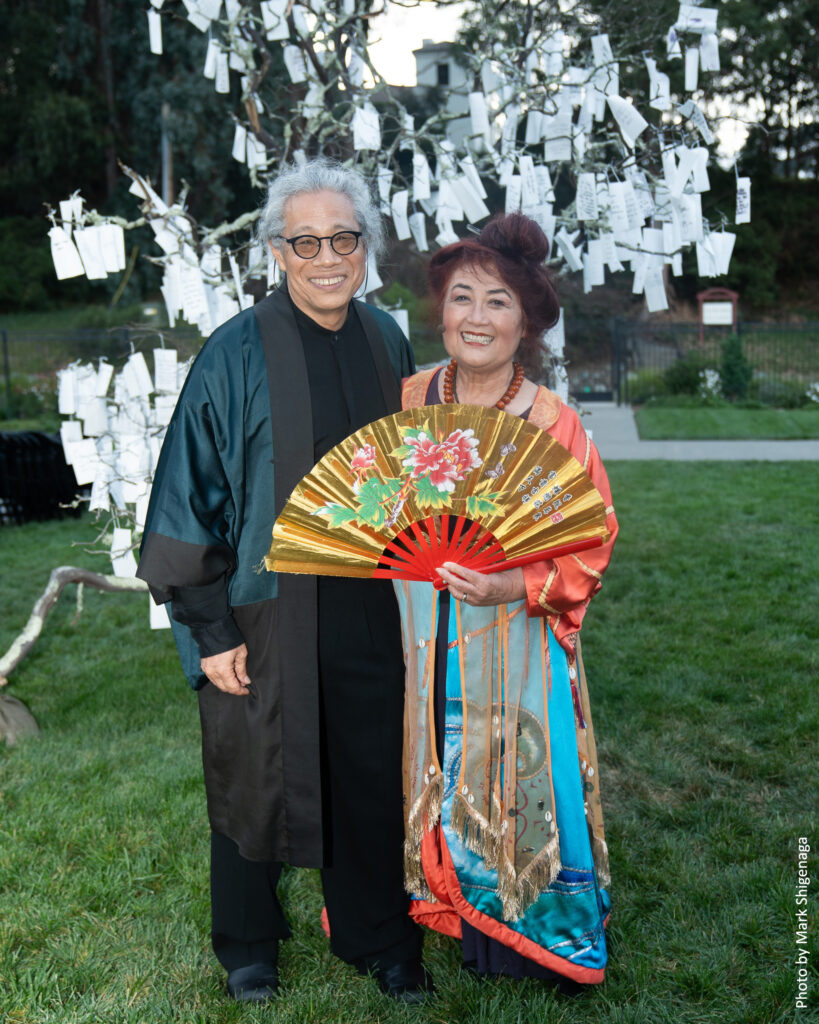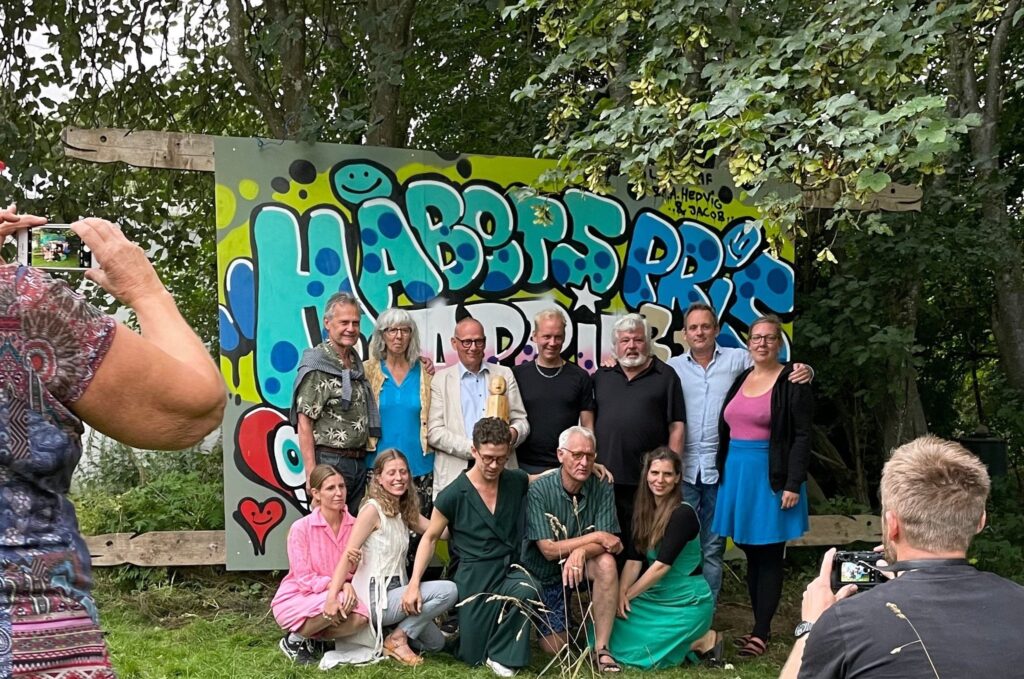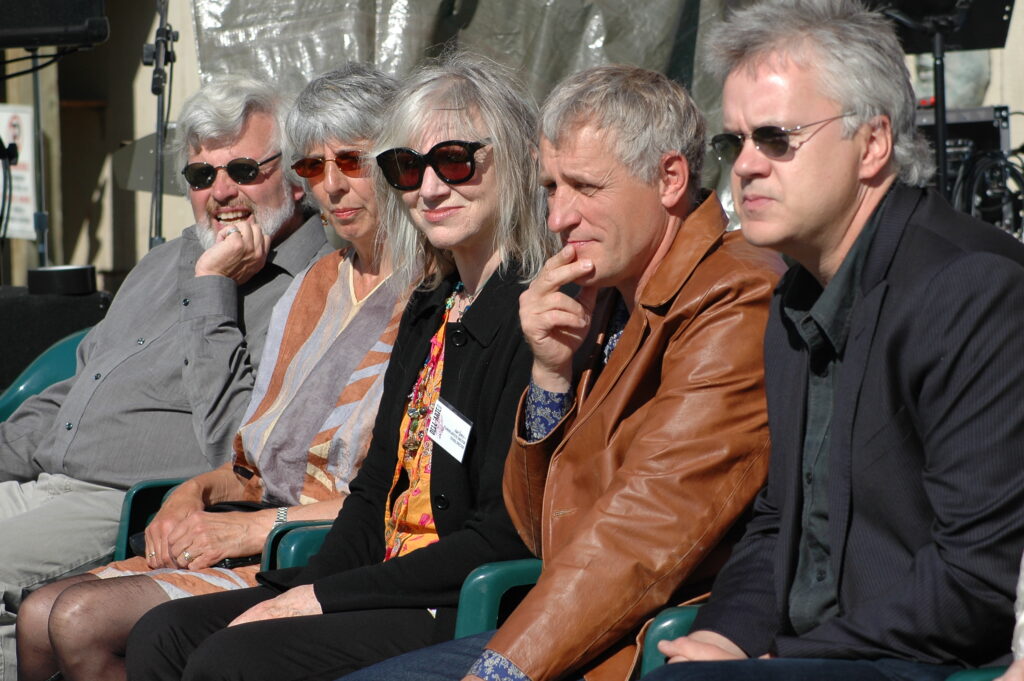Håbets Pris/The Prize of Hope til FIRST VOICE v/Brenda Wong og Mark Izu, San Francisco, USA

Håbets Pris gives til en person eller et teater, som har arbejdet for det menneskelige håb; vovet, kærligt, vulgært, alvorligt, poetisk…med gnistrende energi mod vanetænkningen, som er vor kulturs største trussel: For en verden, hvor folk bruger deres egne øjne, ører, stemme.
Brenda Wong Aoki og Mark Izu, FIRST VOICE, San Francisco, får Håbets Pris/The Price of Hope 2024 for et kunstneriske arbejde med et gennemført multietnisk perspektiv.
Som astronauter ude i verdensrummet ser de jordkloden som en helende sammensmeltning, en verden, hvor vi skal lytte til den enkeltes personlige eller “første stemme”.
Med denne vision skabte de for snart 50 år siden deres fælles platform: FIRST VOICE.
Brenda Wong Aoki er danseren, og historiefortælleren. Hun har bl.a japanske rødder og har arbejdet med udgangspunkt i den japanske No tradition, som skiver sig tilbage til trettenhundredetallet.
Mark Izu, er komponisten og musikeren. Også han har en japansk Sensei/mester og har studeret Gagaku – den antikke japanske kejsermusik – gennem år. I hans version fusioneres dette til bl.a. asiatisk-amerikansk Jazz.
Brenda Wong Aoki bruger sin egen personlige stemme, sin autentiske first voice som indhold i sine forestillinger. I sin egen families historie ligger gemt en relation mellem en japaner og en europæer, som førte til racelove på tværs af USA.
I forestillingen, Uncle Gungiro’s kæreste, fortælles om en forbudt kærlighed mellem Brenda Wongs japanske grandonkel, Gunjiro og den hvide kaukasiske Helen Gladys Emery i det tidlige nittenhudredetals USA.
Deres annoncerede forlovelse udløste i samtiden et ramaskrig: Et ægteskab mellem en gul mand og en hvid kvinde var umuligt at acceptere! Reaktionen i San Francisco førte til optøjer i gaderne. Familen måtte flygte over hals og hoved fra Californien til Seattle. Det førte til dødsfald og en racelov, som først blev ophævet i 1948.
Aokis bedstefar, Reverend Chojiro Aoki, kom fra Japan i 1880’erne og blev en af grundlæggerne af San Franciscos Japantown. Den japanske arv gennemsyrer Brenda Wong Aoki og Mark Izus arbejde i FIRST VOICE.
Vi må forstå, at det begynder med en fortælling af den sande usminkede historie. Betydningen af denne historie illustreres af Aokis grantante, der ikke ville dø, før den “forbudte historie” blev fortalt. Ikke lang tid efter premieren sov hun ind 107 år gammel.
I forestillingen, “Ballad of Bones”, fortælles om japanske efterkommere i USA, som mærkede udstødelsen under anden verdenskrig. 120.000 amerikanere med japansk afstamning blev sendt i interneringslejre efter Japans angreb på USA ved Pearl Harbor. Også idag mærkes afstand mod asiatere i USA.
Det vigtige i FIRST VOICE er på mange platforme at skabe en indføling og forståelse for “den anden”, en medskabning, som kan komme fra Honolulu eller Chinatown.
FIRST VOICE arrangerer også storslåede offentlige “møder” uden ord med fællesdanse, hvor hundredevis af mennsker danser sammen på en åben plads i San Francisco. Så bliver de personlige dansetrin og rytmen til et fællesskab.
FIRST VOICE har gennem år formået at skabe et kunstnerisk rum for møder mellem mennesker med en mangfoldighed af forskellige stemmer, som blander sig og forstærker de multietniske perspektiver. Kunst der vil omfavne og inkludere.
Tillykke til Brenda Wong Aoki, Mark Izu og FIRST VOICE med Håbets Pris 2024. Netop i en tid, hvor etniske modsætninger bliver til krige, er den sanddruelige lyttende stemme en “first voice” og vejen til håb.
f. Institut for Folkeligt Teater * & Dell’Arte International
Lars Olsen Birthe Rosenfeldt
*) Priskomiteen består i Danmark desuden af Moqi Simon Trolin, formand, teaterchef, Allan Helge Jensen, skuespiller, Lotte Augustesen, journalist, Marie Knudsen-Fogh, skuespiller, Marie Tourell Søderberg, skuespiller, Jeppe Groot, rådgiver, Selma, Nanna, Helga Rosenfeldt-Olsen, forfatter, kunstner, skuespiller.

Medlemmer af Institut for Folkeligt Teater, som giver Håbets Pris:
Nordisk Teaterlaboratorium, Holstebro, Aarhus Teater, Aarhus, Aalborg Teater, Aalborg, Vendsyssel Teater, Hjørring, Teater Nordkraft, Aalborg, Sort/Hvid, København, Teatercentrum, København, Kaospiloterne, Aarhus, BAS, Brønderslev, Dell’arte International, Californien, Brønderslev Erhverv&Turisme, Brønderslev, Det Flyvende Kuffertcirkus, Bælum. Kulturhuset Kappelborg, Skagen, Ragnarock, Espergærde, DATS, Odense. Västanå Musik og Teater, Sunne, Sverige,

The Prize of Hope/Håbets Pris is an international award. It has been given in Denmark since 1989 and in the US since 2008. The prize is given every second year at Aasen Theatre and every other year in the US at Dell’Arte Theatre in California. The vision of The Prize of Hope is to promote a living, vital, sharp and innovative popular art.
The Prize of Hope will be given to a person or a theatre who has worked for human hope; daring, loving, vulgar, serious, poetic…with sparkling energy against habitual thinking, which is the gravest threat to our culture: For a world where people use their own eyes, ears and voices.
Prize of Hope for a living, popular theatre.
32. Västanå Music & Theatre 2023 and Leif and Inger Stinnerbom, Värmaland, Sweden. They create a vibrant, lively folk theater in Värmland, which people flock to.
31. Zimbabwe Theater Academy and Lloyd Nyikadzino 2022, Harare, Zimbabwe. They lead the way with young physical theatre in Africa.
30. Aprilfestival, Denmark 2021.The world’s largest theatre festival for children and young people.
29. Kitt Johnson, X-act Copenhagen, Denmark 2019Kitt Johnson is a shaman of our time.
28. UNIVERSES Theater Company 2018, New York, USA.They are a source of change, a continuing struggle for equality on the theater scene in the United States.
27. C:NTACT & Henrik Hartmann 2017. Frederiksberg, Denmark.C:NTACT creates intercultural encounters between people who otherwise would not have met: Every person carries a hope and a wish to succeed.
26. Cornerstone Theater Company 2016. Los Angeles, USA,Cornerstone Theater Company creates theater art, which brings people together regardless of race or background.
25. Théâtre du Solei & Ariane Mnouchkine 2015.“La Cartoucherie”, Paris, France. For 50 years, as an independent theatre collective, to have shared life, work and art, and together created a world class popular theatre.
24. Clowns Without Borders 2014. Bringing joy and hope to needy children in the shadow of war.
23. Christian Lollike 2013. Dramatist. Copenhagen, Denmark. For a radical reinterpretation of popular theatre with taboo as the means and dialogue as the aim.
22. Geoff & Dan Hoyle 2012, San Francisco, USA. Individually, they are amazing performers and as father and son, they are a multi-generational force for good.
21. Eugenio Barba and The Odin Theatre 2011, Holstebro, Denmark. They have created an important contribution to the cultural heritage of the world and have been a cornerstone in Danish and Nordic theatre for almost half a century.
20. David Simpson, Jane Lapiner and Human Nature 2010, Petrolia, USA, received the Prize of Hope 2010. They have created original theatre pieces about significant environmental and climate change.
19. Suzanne Osten, Unga Klara 2009, Stockholm, Sweden, received the Prize of Hope 2009 because she has worked with theatre from the perspective of the child and other vulnerable groups all her life. She is part of the reason that Scandinavian children’s and youth theatre is amongst the best in the world.
18. Tim Robbins and The Actors’ Gang 2008, Los Angeles, USA, received the Prize of Hope 2008 for leaning into the wind with their combination of contemporary immediacy, public engagement and great theatrical craft created with a profound hope for changing the course of life for better. The event was hosted by Dell’Arte International in Blue Lake, California on June 21.
17. Set designer Poul Fly Plejdrup 2007, Odder, Denmark, for his magical open theatre. The open theatre is the space of living theatre and the theatre of hope.
16. Dell’ Arte International 2005, Blue Lake, USA. They have created a physical theatre school of an international standard in the far North of California’s Redwood district, which attracts students from all over the world.
15. Finn Hesselager 2004, Nørre Snede, Denmark. For his significant contribution to the development of Danish theatre, television and film, through his teaching of an entire generation of Danish actors.
14. Bådteatret (The Boat Theatre) The Prize of Hope 2003 went to Bådteatret, with its three brave captains Tue Biering, Rolf Heim and Emil Korf-Hansen 2003 because they insist on performing. In spite of financial cuts, they continue to perform political theatre in the spirit of our era.
13. Helle Ryslinge 2002, film director, Copenhagen, Denmark. For pioneering work within Danish film, uncovering societal taboos with her microscopic attention to detail.
12. Klaus Hoffmeyer 2001, Artistic Director at the Royal Theatre Copenhagen, Denmark. For keeping his core intact whether on the student scene or at the Royal Theatre of Denmark.
11. Åsa Simma 2000, Sámi theatre and film, Sápmi. Through her art, she awakens resources hidden in the rituals and images of the ancient mountains of Sámi culture.
10. Randi Patterson 1999, Living Movement & Nyt Dansk Danseteater, Copenhagen. Founder and pioneer of modern dance in Denmark.
9. Chris Torch 1998. Intercult, Stockholm, Sweden. Founder of Earth Circus & Shikaste. A pioneer in intercultural scenic art in Sweden, the Nordic countries and Europe.
8. Grenland Friteater 1997, Porsgrunn, Norway. For twenty years of pioneering work in group theatre in Norway – in a continuous search for identity in modern post-war Norway.
7. Hans Rønne 1996. Teatret, Odder, Danmark. For his solo performances as a distinguished landmark of Danish children’s and youth theatre in the year of the cultural city.
6. Hans Hellberg 1995. Narren, Stokholm. Sweden. Founder of group theatre in the Nordic countries and its first important architect.
5. Arne Aabenhus & Asger Hulgaard 1994. Dansk Amatør Teater Samvirke. Founder and creator of Dansk Amatør Teater Samvirke (Danish Amateur Theatre Cooperation) for many years.
4. Iben Nagel Rasmussen 1992. Odin Theatre, Holstebro, Denmark. For being a pioneer of new acting in Denmark and for the performance ITSI BITSI.
3. Tage Hind 1991. Institut for Dramaturgi, Aarhus University, Denmark. For being a pioneer in the establishment of a new vision of theatre and founder of Institut for Dramaturgi at the University of Aarhus.
2. Aleksander Jochwed 1990. Theatre workshop Den Blå Hest, Aarhus, Denmark. Because the theatre breaks down barriers in the mind and between the East and the West.
1. Trevor Davies 1989. Festival of Fools, Copenhagen, Denmark, for creating a popular space for theatre and the Festival of Fools, as a cultural mediator and force to be reckoned with.
Institut for Folkeligt Teater and AASEN TEATER, BRØDHOLTVEJ 120, DK-9740 JERSLEV, Denmark
aasenteater@gmail.com, www.haabetspris.dk , www.aasen.dk, +45 61717343
